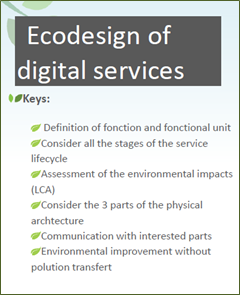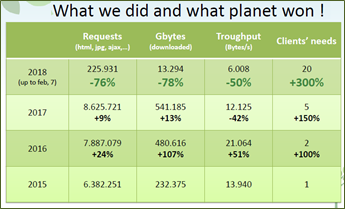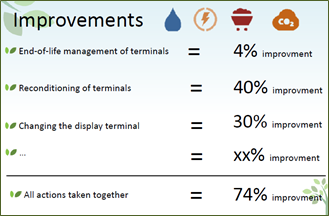Both the video and the PowerPoint presentations are available on the webinar page at https://ictfootprint.eu/en/webinar/how-ecodesign-digital-services-focus-greenconcept-project
Download the Webinar's slides
This, the 8th in the series of ICTFOOTPRINT.eu webinars provided an informative overview on how to incorporate eco-design into ICT services through presentation of the GreenConcept project. GreenConceps aims to help SMEs implement eco-design principles into the development of their digital services (including web site, social network, IOT appliance, and platform, amongst others). Today it is imperative to look for new design solutions that are environmentally-friendly and ultimately result in a reduction of materials and energy. Eco-design principles help the ICT sector become more sustainable.
“How to develop new digital services without greatly damaging the environment?”. Caroline Vateau and Damien Prunel outlined the environmental impact that the ICT sector has on the environment. ICT is one of the most polluting sectors in the world. Around 2%-4% of world’s GHG comes just from ICT (this is as much as the aviation industry) and the world’s energy consumption related only to the Internet is 2 times as much as all of the energy consumed in France. In France, for example, the digital sector accounts for 13% of all energy consumed. The digital sector needs to take action to make the transition to sustainability.
Eco-design is an approach to designing products with special consideration of the environmental impact that these will have during their entire lifecycle assessment (LCA). Applying eco-design principles to the overall life cycle of digital services, rather than focusing merely on the product (e.g. phone, computer), decreases environmental impact considerably. As to the benefits to be obtained by organisations, eco-design provides competitive advantages and even creates new products and profitable business models.

So how do we go about the eco-design of a digital services with an end-user approach? Four parameters should be taken into consideration: End-user devices (e.g. smartwatch, smartphone, amongst others), Telecom Network Usage, Data Centres and Software. Key points to implement eco-design procedures, illustrated in the image on the right, are based on recognized international standards. ICTFOOTPRINT.eu Map of ICT Methodologies contains a list of standards and methodologies, with dedicated fact-sheets available for download, regarding goods, services, organisations/projects and cities, focusing on potential impacts on the environment and other KPI-like organisational carbon footprint calculation methodologies.
The GreenConcept project has been helping SMEs in implementing eco-design principles while developing a digital service. Since its launch, the project helped SMEs to identify 50 environmental improvement actions, that achieved between an 80%-900% reduction of environmental impact. How? By extending the life time of ICT devices, using cloud computing, as opposed to acquiring data storage hardware, optimizing software interfaces, suppressing service features not useful for the final client, renting ICT services rather than buying, consuming local data close to the user (thus avoiding the network energy consumption associated with processing data stored in a distant location), among others. Besides the reduction of environmental impact, these SMEs improved end-user experience, developed new business models and obtained financial benefits.
When Silvana Muscella asked if it is easy for an SMEs to implement eco-design principles, Caroline and Damien replied affirmatively, especially compared to large organisations. With an eco-design consultancy service, the SME is given the diagnostics in a few hours, with a list of simple actions to be implemented immediately. Regarding e-waste, Caroline added that ICT should pay more attention to developing devices with a long-lasting designusing a modular approach. This allows enables repair or replacement of just one piece, as opposed to disposing of the entire equipment.
“Occitanie is an administrative region in south of France, with over 10.000 digital businesses”, stated Christophe Fernique. The ICT industry in this area is almost uniquely made up of SMEs, where 99% have less than 50 employees ”.
The Chamber of Commerce and Industry (CCI) Hérault, aware of the potential that eco-design represents for this local ICT hub, launched the GreenConcept project. The project’s main goal is to support local companies in decreasing the environmental impact of ICT products and services, thanks to eco-design principles. The pertinence of this topic caught the attention of ADEME (French Environment & Energy Management Agency), which decided to support the GreenConcept mission.

Since the launch of GreenConcept in 2016, over 1.000 local companies, from diverse business sectors (such as health, agriculture, transportation and communication, among others), have already benefited from the implementation of eco-design principles. According to Christophe, “The main challenge for SMEs to become Green in ICT is the lack of awareness of its benefits. First, it is important to make the companies aware of their environmental footprint, and follow up with the skills necessary to improve their sustainability and gain competitive advantage. It is crucial that they are aware that eco-design principles must be applied right from the beginning of the ICT service’s development”.
Customised support was provided to 30 local SMEs, in implementing eco-design principles in the development of digital services. Thanks to the financial support provided by the GreenConcept project, the companies only had to provide minimal financial participation obtain a complete consultancy and training session in green IT: 1 day for ICT environmental footprint diagnosis and 7 days of full individual support on digital eco-design. Furthermore, these SMEs had the opportunity to join 3 workshops where French experts from Green ICT services provided SMEs with skills in green ICT. “After the training, these 30 SMEs were awarded an eco-design certification recognised in France”.
Sebastian Bernis is the CEO of BSWEB, one of the 30 SMEs supported by GreenConcept in their eco-design journey. BSWEB is a Digital Communication Agency that provides Business Intelligence from Big Data Information, extracted with bots from the Internet.
“We are a company that uses SaaS (Software as a Service) to provide services to our clients. We collect complex data from the internet and make it easily understandable for our clients. BSWEB collects high volumes of Big Data from the internet, analyses the info and makes it available to their clients in a dashboard with a user-friendly interface”, explained Sebastian.
“I am interested in topics related with sustainability and when I heard about GreenConcept, it caught my attention”, he stated. “Thanks to the support of GreenConcept, we realise that over 50% of BSWEB’s environmental impact comes from Cloud usage”.
Before the GreenConcept project, when collecting data from the internet, only a small part of this was needed for its clients. In 2016, out of 480 GB of data download, only 100 KB contained useful data. “This was a big waste of data”, said Sebastian.
With the support of GreenConcept, BSWEB started implementing eco-design in its digital services. The company is now able to request only the data they need to download from the internet. In fact, despite an increase in BSWEB clients of 300% by 2018, the company reduced the amount of gigabytes downloaded by 78%.
“This provided several benefits to the company: we reduced the amount of data downloaded, the costs of BSWEB servers decreased as well as the time needed to download the data. We now provide our clients with a better service, at a cheaper price”, concluded Sebastian.

With the support of GreenConcept, BSWEB started implementing eco-design in its digital services. The company is now able to request only the data they need to download from the internet. In fact, despite an increase in BSWEB clients of 300% by 2018, the company reduced the amount of gigabytes downloaded by 78%. “This provided several benefits to the company: we reduced the amount of data downloaded, the costs of BSWEB servers decreased as well as the time needed to download the data. We now provide our clients with a better service, at a cheaper price”, concluded Sebastian.
ELA Innovation, represented by Valentin Girard, has the provision of RFID technology solutions as its core business. GreenConcept helped ELA Innovation identify that the main sources of the company’s environmental footprint came from terminal use, terminal fabrication and cloud computing usage. The company was able to reduce its footprint by 74%, just by changing the terminal’s displays, reconditioning the terminals, and handling their end of life more efficiently.

Valentin highlighted that these results were easily achieved. GreenConcept made a diagnosis in April, followed by advisory services until November of the same year. GreenConcept then provided ELA Innovation with a customised report, describing the results achieved and some indications on future actions to be taken to further improve the company’s sustainability.
 © 2018 ICTFOOTPRINT.eu – ICTFOOTPRINT.eu has received funding from the European Commission’s Horizon 2020 research and innovation programme under the Grant Agreement no 690911. The content of this website does not represent the opinion of the European Commission, and the European Commission is not responsible for any use that might be made of such content.
© 2018 ICTFOOTPRINT.eu – ICTFOOTPRINT.eu has received funding from the European Commission’s Horizon 2020 research and innovation programme under the Grant Agreement no 690911. The content of this website does not represent the opinion of the European Commission, and the European Commission is not responsible for any use that might be made of such content.
Privacy Policy | Disclaimer Terms of use